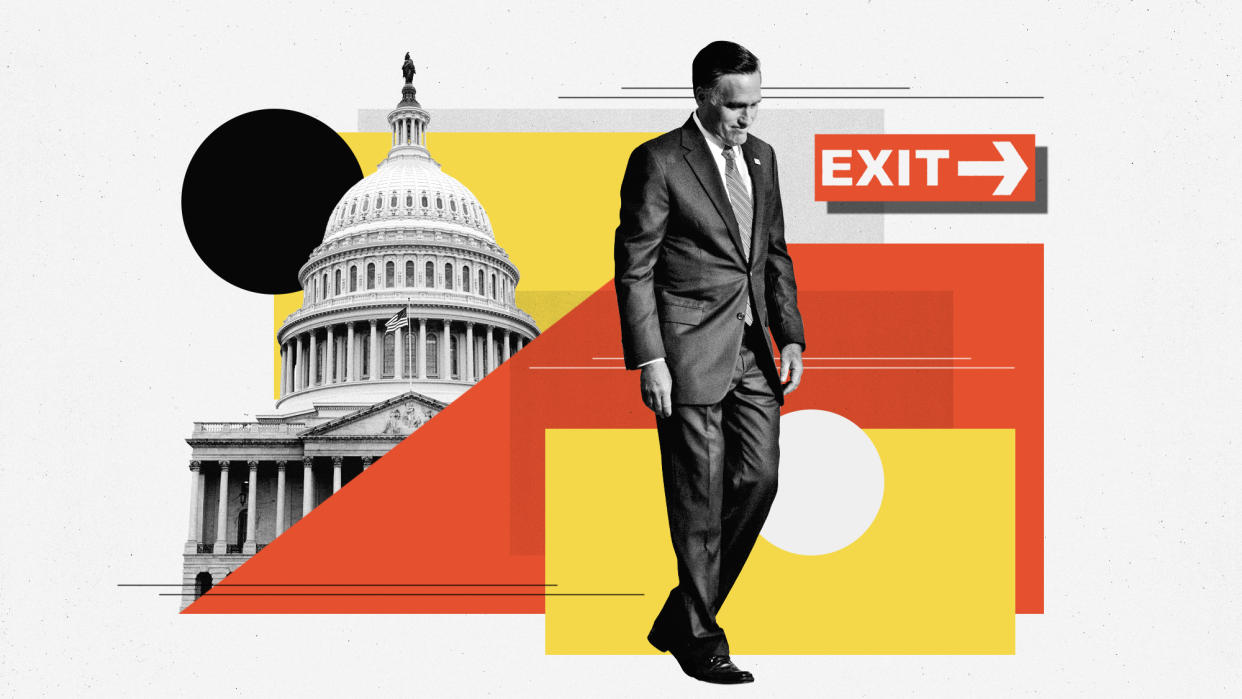Is Mitt Romney's retirement the end of a Republican era?

- Oops!Something went wrong.Please try again later.
"You know, contrary to a lot of expectations, I enjoy my work in the Senate a great deal."
So began Utah Senator Mitt Romney's announcement this week that, despite his aforementioned enjoyment, he will not run for a second term in office in 2024. Instead, citing his age (76), Romney explained that it was time for "the next generation" to "step up" and make the political decisions they, themselves, will have to live with in the future.
For as much as Romney hoped to frame his retirement announcement in optimistic terms of a generational shift toward a more capable, committed future, his looming departure from the Senate is at the same time a tacit admission that the political ground has shifted under his feet. Staunch personal conservatism aside, Romney's time in the Senate has been defined by a willingness to both negotiate toward the center and criticize his own party's extremes. Speaking with The Washington Post on Wednesday, Romney acknowledged that the party that nominated him as its standard bearer to run against President Barack Obama in 2012 represents just a "very, very small" portion of the GOP today. But if conservatives can swing so wildly in the direction of a populist like Trump, there's a chance it could "change back in the direction of my wing of the Republican Party" as well.
What does it mean that Mitt Romney has chosen this as his time to bow out of electoral politics, and where does the GOP go from here in his absence?
What the commentators said
Romney's arc from presidential nominee to outgoing senator is a "story about a changing Republican Party," according to NBC News. His replacement, virtually guaranteed to be a Republican in "ruby-red" Utah, "will be more conservative and Trump-friendly," the network predicted. For his part, Romney stressed to Politico that although he won't get involved in that race, he doesn't "think we’re going to get someone off the wall." FiveThirtyEight agreed in part, noting that the state's concentration of Mormons, including Romney, "have made the local GOP more Trump-skeptical than most."
Not so for the nation as a whole, countered former Republican Rep. David Jolly. Romney's retirement is "the latest wake-up call for those who still believe the GOP may one day return to traditional conservatism," Jolly eulogized for MSNBC. "It won't." Romney's departure is itself a departure from elections as "ideological contests" for a more fraught "contest over fundamental democratic and constitutional norms."
Romney is "one of the most significant politicians of the 21st century" and "occupies a unique role in the Senate," according to Semafor. But, despite that unique significance, "his more recent chapters were often defined by his relationship with Trump" (Trump bragged that Romney's retirement was "FANTASTIC NEWS FOR AMERICA, THE GREAT STATE OF UTAH, & FOR THE REPUBLICAN PARTY" on his Truth Social platform). The contrast between Romney and the rest of the GOP is a sign of how "the Republican party has changed, I would say deteriorated," lamented CNN's Van Jones, who described the senator as a "worthy opponent" to Obama in 2012 (that year he'd called Romney a "douche" for his performance in the first presidential debate. He later apologized). "I can’t believe 10 years later, I’m on CNN begging the guy not to go."
What next?
Romney still has over a year left on his term, and has vowed to stay active throughout. "I’m not going out on a farewell tour,” he told the Washington Post. “I’m not leaving the party, not retiring." Part of that process includes a deliberate effort to encourage West Virginia Sen. Joe Manchin (D) and Arizona Sen. Kyrsten Sinema (I) to stay in office and maintain his vision of a political center in the Senate. In particular, he's discouraged Manchin from mounting a third-party bid for the White House, telling Politico "I tell Joe that in my opinion, him running would only serve to elect Donald Trump."
In his home state of Utah, meanwhile, Romney's pending departure had already prompted dozens of prospective replacements to reach out to GOP Chair Rob Axson even before the senator made his official announcement — at least a dozen of whom "have a compelling case to be made," Axson told Salt Lake City's KJZZ.

